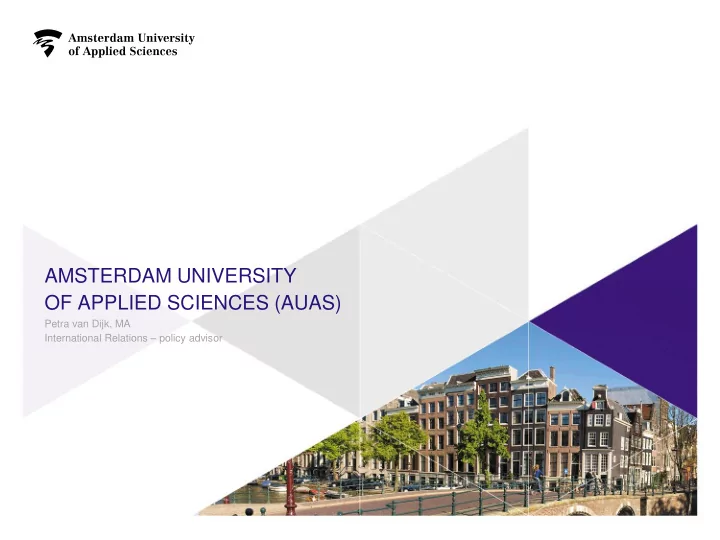

AMSTERDAM UNIVERSITY OF APPLIED SCIENCES (AUAS) Petra van Dijk, MA International Relations – policy advisor
HIGHER EDUCATION IN THE NETHERLANDS
HIGHER EDUCATION IN THE NETHERLANDS High quality and international student environment 14 Research universities: 253,500 students 37 Universities of applied sciences: 446,000 students 8 University medical centres Bachelors – masters degree structure since 2002 Government-funded
THE NETHERLANDS
UNIVERSITIES OF APPLIED SCIENCES Seven sectors: 1. Economics 2. Health 3. Arts 4. Agriculture 5. Education 6. Social-cultural 7. Technology
UNIVERSITIES OF APPLIED SCIENCES Bachelor, master programmes – professional education PhD programmes with research universities Bachelor programmes: 240 ects Master programmes: 60 – 90 – 120 ects Minors: 7.5 to 30 ects
ABOUT AMSTERDAM UAS Students 50,000, International > 2,100 Employees 3,500 Revenue € 370 m Programmes 69 Bachelor’s, 15 Master’s, 5 associate degrees International > 9 Bachelor’s, 1 Master’s , 44 minors in English
ABOUT AMSTERDAM UAS Seven faculties Students • Design and Communication 8,722 • Economics and Management 14,254 • Education 6,095 • Health Professions 3,506 • Social Work and Law 8,110 • Sports and Nutrition 2,601 • Technology 6,363
STRATEGIC ISSUES
STRATEGIC ISSUES Differentiation Excellence, associate degrees, flexible and blended learning Study success Limit drop- out rates to ≤ 25% (now 30%) Applied research 7 centres of applied research participate in the multidisciplinary focal points
AMSTERDAM ACADEMIC ALLIANCE
EVIDENCE-BASED PROFESSIONAL
MULTIDISCIPLINARY RESEARCH: FOCUS AND MASS Focal points • Amsterdam Creative Industries • Urban Technology • Urban Management • Urban Vitality Additional focal themes • Urban Education • Entrepreneurship
AMSTERDAM CREATIVE INDUSTRIES >> INNOVATIONS IN FASHION
URBAN TECHNOLOGY >> ULTRA ENERGY-EFFICIENT VEHICLES
URBAN MANAGAMENT >> SOCIAL IMPACT
URBAN VITALITY >> AMSTERDAM INSTITUTE OF SPORT SCIENCE
INTERNATIONAL STRATEGY European consortium • A limited number of preferred partners • Increase visibility in Europe • Cooperation in education and research • Development of joint and double degree programmes • Focus on smart urban solutions – triple helix
Recommend
More recommend